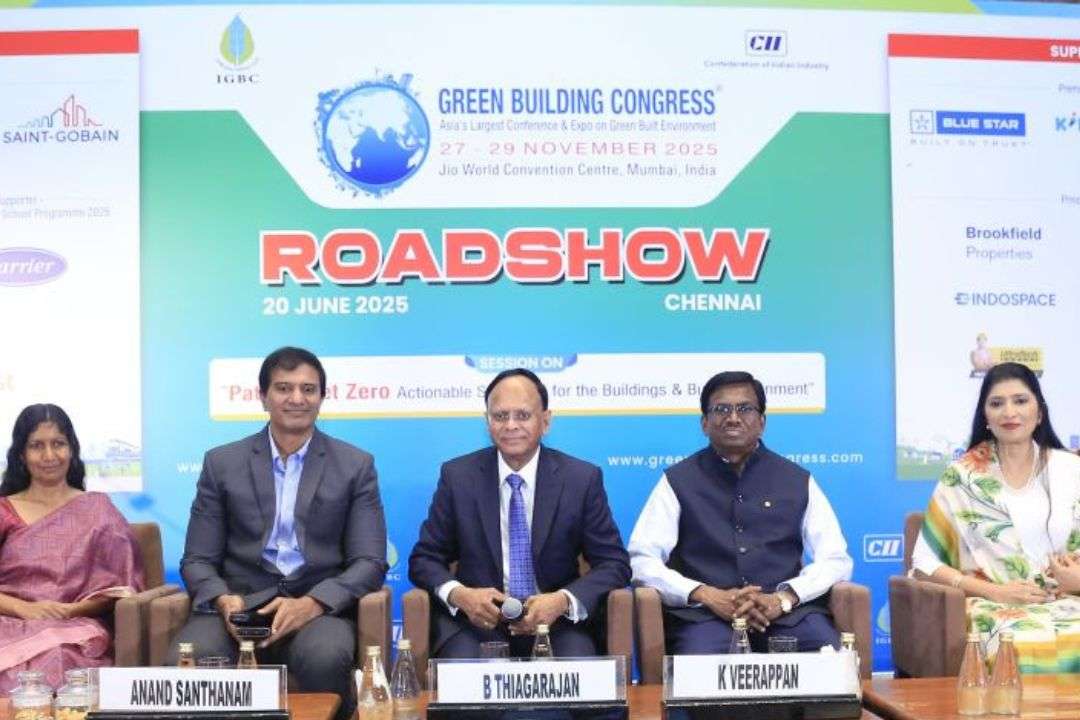The Indian Green Building Council (IGBC), an arm of the Confederation of Indian Industry (CII), held a regional roadshow in Chennai as a lead-up to the 23rd Green Building Congress, scheduled for 27–29 November 2025 at Mumbai’s Jio World Convention Centre. The roadshow, held at Feathers – A Radha Hotel, brought together professionals from architecture, engineering, planning, and government. The theme of the event, “Path to Net Zero: Actionable Strategies for the Buildings & Built Environment,” focused on the urgent need to adopt practical, scalable methods for reducing the environmental impact of buildings.
Speakers highlighted Tamil Nadu’s contribution to the national green building movement, underlining how government and industry can work together to improve resource use, reduce emissions, and promote long-term sustainability.
Mahesh Anand, Chair of the IGBC Chennai Chapter, opened the event with a welcome message. He was followed by Ajit Chordia, Chair of CII Chennai Zone and former IGBC Chennai Chapter Chair. Mr Chordia emphasized the state’s potential to guide India’s environmental transition. He noted that programs like the Tamil Nadu Climate Change Mission and the Green Tamil Nadu Mission go beyond policy—they provide tools for real progress on the ground.
He also referred to the Green and Liveable Cities report released earlier this year, which outlines a roadmap for making cities more environmentally and economically resilient. “This is a shared journey, and IGBC is working closely with public and private stakeholders to implement sustainable solutions,” he said.
B Thiagarajan, National Chairman of IGBC and Chair of the 2025 Green Building Congress, shared broader insights into India’s growing green footprint. “Sustainability today is a competitive advantage,” he noted. “Buildings that meet green standards reduce environmental harm while also delivering business value. With over 13.7 billion square feet of green-certified area and nearly 16,000 rated projects, India is moving in the right direction.”
He pointed to Chennai’s landmark green buildings—such as L&T Headquarters and Olympia Tech Park—as proof that high-performance buildings are possible at scale. He stressed the importance of continued innovation and cooperation to meet Net Zero targets.
A panel discussion led by B Thiagarajan featured key experts from the fields of industry and architecture, offering diverse insights on sustainable building practices. The panel included K Veerappan from Larsen & Toubro, Anand Santhanam of Saint-Gobain India, Dr Ponni Concessao of OCI Architects, and architect Anupama Mohanram from Green Evolution.
Together, they shared practical strategies and experiences that highlighted the role of innovation, design, and collaboration in advancing eco-friendly construction and achieving Net Zero goals. They shared real-world examples and approaches to reducing carbon footprints in the built environment. Topics ranged from material choices and passive design to performance monitoring and green finance. The session offered attendees actionable ideas to take back to their own projects and institutions.
M Anand, Deputy Executive Director of CII-IGBC, presented key details about the upcoming Green Building Congress. The event, he said, will be a major platform for businesses, city officials, and professionals interested in sustainable infrastructure. With a focus on partnerships, innovation, and large-scale implementation, the Congress aims to help shape India’s cities of the future.
With over 1,080 certified projects and more than 597 million square feet of green building area, Tamil Nadu continues to rank among the top states for sustainable construction. Chennai, in particular, has shown strong progress in adopting environmentally sound building practices across sectors—ranging from offices and manufacturing to schools and hospitals.
Key infrastructure such as the Chennai Metro, smart campuses, and high-efficiency commercial buildings illustrate how urban growth can align with environmental goals. The IGBC Chennai Chapter remains active in spreading knowledge and driving adoption through regular interaction with local authorities, builders, and design professionals.








